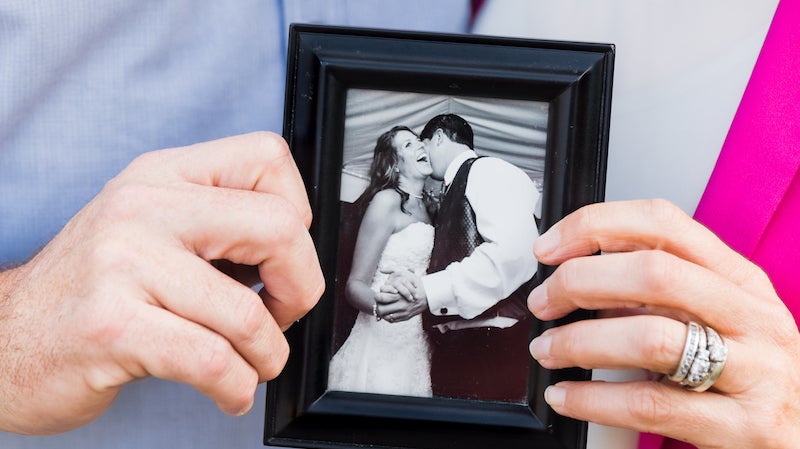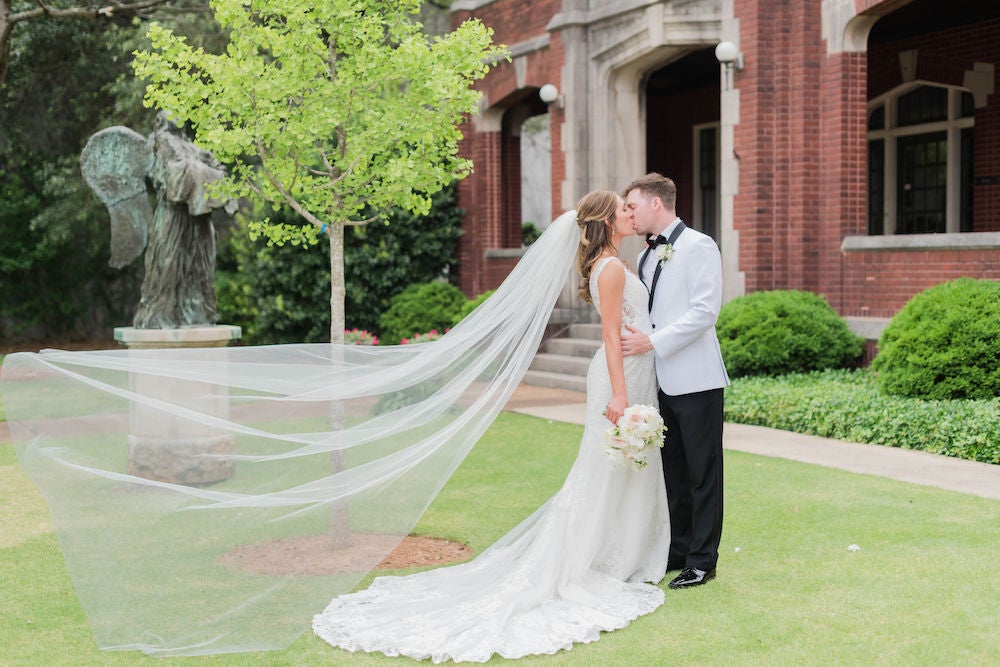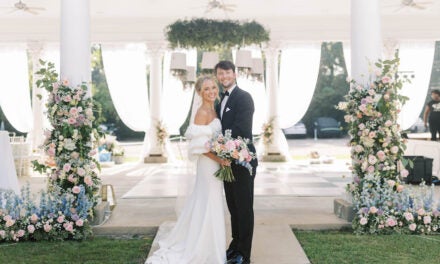Rachel Stockard vividly remembers those days at the baseball fields in Cahaba Heights, the ones where she put her shades on and pretended everything was great. “I had those big glasses on, with crocodile tears pouring down my face seeing all these dads with their sons,” she recalls today. “Putting on that mask I was so burdened and exhausted.” All she could ask herself in those moments was, “Is Brian going to be back?”
Her husband had left home for an addiction recovery facility seven days before their daughter Morgan’s 16th birthday in 2013. Their son Bo was 6, and their youngest Lexi was 3. On top of that, Rachel was teaching full time and getting a master’s degree. Life was not easy as a temporary single parent. But still she’d told Brian, “Go, get better!” seeing it as a short-term sacrifice for a long-term gain. Or at least that’s what she hoped for as she faced the ugliest bear she could have ever imagined.
The Start of Things
Rachel and Brian met back in 2002 when Rachel was Brian’s daughter Morgan’s kindergarten teacher. He’d been divorced about two years at the time, and they had mutual friends from Auburn University and growing up in Birmingham (she went to Homewood and he to Vestavia Hills High School). When the school year ended, Brian asked her out, and they married a year later in June. As Rachel will tell you, “I was fortunate to have a relationship with Morgan before I got to know Brian.”
When they met, Brian checked every box on Rachel’s list and shared how he had just gotten baptized and was involved at the then-fledgling Church of the Highlands. But four months after they married, Brian sat Rachel down. “I think I have a problem with pain medication,” he told her. “What?! We just got married!” she thought immediately. “This is not part of the plan.” At that point she says she knew nothing about addiction and thought it was a choice, not a disease. So they put Band-Aids on everything and kept moving through life as planned. “I had grown up in a house with a dad who was a football coach,” Rachel says. “I just told Brian, ‘Just stop, you are weak.’”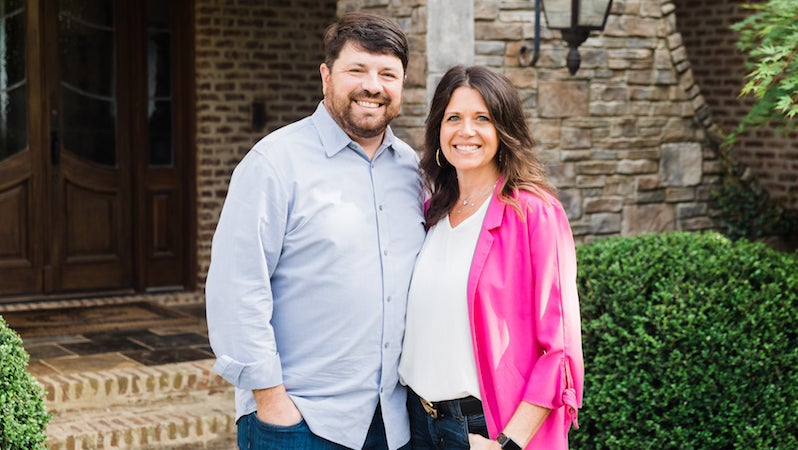
As it turns out, after his divorce Brian had been depressed and started taking pain medication to numb his pain—a habit he had no idea would snowball for the next 12 years before he’d get sober. “I would be at church on Sunday asking God to take it away from me, and the next day I’d be doing it again,” he says.
He likens addiction to feeling like you are drowning. “My head would come above water and then it would come back down,” he says. “I would get these moments of clarity and say, ‘I don’t want to do this anymore.’” But more and more his life, hidden behind a veiled curtain everyone outside his house saw, looked like chaos and despair.
And as Brian will tell you now, addiction is a family disease. Everyone around the one with the addiction gets sick in their own way. “Our house was awful,” Rachel recalls. “There was no peace. I was mad, hurt, devastated.” And so, being a first born and a teacher, her response was to take control as life spun more and more out of control. “I was checking phone records and up all night,” she admits. “I was literally like CSI Vestavia Hills. I was following him and wanted to catch him and rescue him.
“What I was doing was the definition of insanity, doing the same thing over and over again,” she continues. “I was screaming at him and he was sad. It was a vicious cycle.”
In 2008 Brian finally sought treatment for the first time. Before that he admits he was still full “of pride and arrogance thinking I was special and didn’t need to do this.” Afterward he stayed sober for close to three years and was immersed in church. But a series of events would send him back into what Rachel calls a “tumultuous tornado” of addiction. Rachel remembers holding up their then 2-year-old in the middle of it and saying, “Look at her! Why you can’t you stop?” “I want to, but I can’t,” he’d reply.
Brian finally hit rock bottom on September 7, 2013 and committed to treatment for the long haul—the autumn that Rachel so vividly remembers crying at the Cahaba Heights baseball fields. “At that point I was all in,” Brian recalls. “I was tired of fighting with everyone around me and hurting the people around me, and I was tired of the pain I was causing and I didn’t want to do it anymore. I made the decision that I was going to do whatever I had to do to get healthy and recover.” And he did.
Rachel’s Side
Rachel didn’t realize it at the time Brian went to treatment, but she had years of healing ahead of her too. The first time Brian had come home from treatment she had thrown a laundry basket at him. “You do the laundry!” she screamed. “I have been doing it for so long!”
“That is not what you do when someone gets home from treatment,” she says today though.
First she had to realize she couldn’t fix Brian. As she learned in Al-Anon, “You didn’t cause it, you can’t cure it, and you can’t control it.” Eventually she’d come to see she was just as sick as he was in all her efforts to save her husband. “I wasn’t breathing or sleeping because I was in such a panic all the time worrying he was going to die,” she says.
And that was just one part of it. With addiction becomes betrayal. Before he left that September, Brian would say one thing and do another. “That’s what (people with addiction) do,” Rachel says. “They are going to protect their addiction with everything they have.”
Seven years later, Brian can see the mess of it in hindsight: “Your husband gets sober, but your life still sucks. You are still and angry and don’t like him, and you are trying to control everything and you don’t know why. It takes humility to call someone who has been through it and let them help you.”
One day in the middle of that tornadic mess of treatment, Rachel noticed a framed photo from their wedding and how she looked at Brian so intently. “Brian would come down the stairs when we first got married, and I would literally do a herkie and toe touch and say, ‘Here’s your coffee, I love you so much!’” she says. “And now I would say, ‘God, I need you to restore those eyes to see him like I did that day because I right now want to whip his butt in 27 different places.’”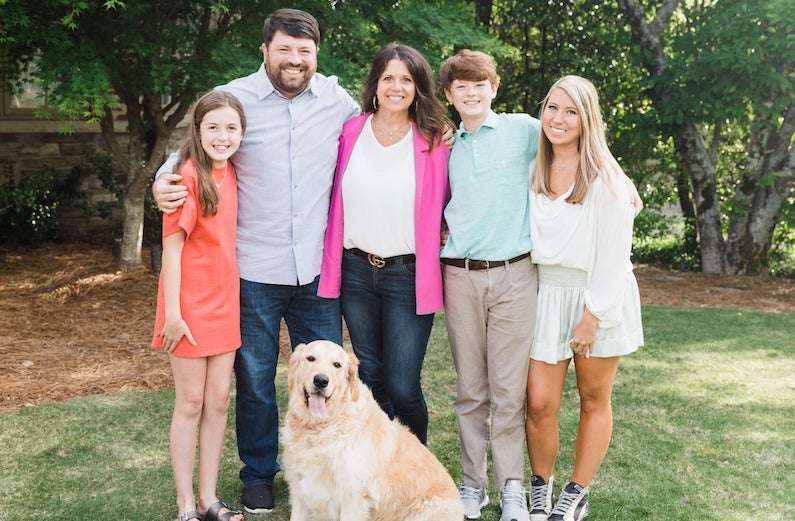
And with time and healing, she started to. She saw that Brian was aggressively and relentlessly pursuing recovery. When she visited him, she would catch a glimpse of the man she married instead of the man who was a wreck emotionally, physically and spiritually when he’d left. “I knew who he was deep down, and that’s why I kept fighting,” she says. “It was the addiction that broke my heart, not Brian. I have a visual of a cement shell (around him), and we had to keep chipping away at getting to where he was because I knew what he was capable of.”
In the end, Brian needed time to heal, and Rachel needed time to heal. When things were bad, family and friends would sometimes suggest divorce, but that was never on Rachel’s radar. “I grew up in a house with divorce, and it was not an option for me though it might be for some,” she says. “I remember thinking that no one is going to put my kids to bed but me. I did not want to wake up Christmas morning and drive to Brian’s house to see my kids.
“Thankfully Brian decided to get help. Our story could have looked very different had he not. I knew if he was going to get help, I was going to stick by him.”
Layer by layer, Brian rebuilt Rachel’s trust with each action down to showing her his gas station receipts for a Powerade. “It’s easy when you stand up there in a wedding dress, and you’re skinnier than you’ve ever been and tanner than you’ve ever been, (to say), ‘For richer, for poorer, in sickness and in health, ‘til death do us part,’” Rachel says. “(But) what do you do when you are in that ‘For richer, for poorer, in sickness and in health’? You fight and ask God to carry you through.”
Sharing their Story
Today, Brian has been sober for nearly seven years. And with the strength of the Birmingham recovery community behind them, Rachel has confidence in his continued healing. “He has a phone book full of people he is checking in with every day,” she says. “They would actually know before I did if he started to slip, and talk about pressure being released.”
What they know now more than ever is the value of sharing their story, especially since they’d kept their journey of addiction hidden for so many years. “I remember thinking (in the middle of it), ‘God, I know there is going to be good coming from this, so when we get through this can you give me a place to tell our story and encourage women?’” Rachel recalls.
Coming into sobriety, Brian’s heart was still with those who were suffering like he had, and he has stayed actively involved in the recovery community, providing encouragement and accountability to others in a series of heartbreak and miracles. “If there is a ministry where you can get your butt whipped on a daily basis, it’s recovery,” Brian says. “I have watched more people who lost their lives to this disease. It’s an epidemic like nothing I have ever seen.”
The Stockards see their message of particular importance in Vestavia Hills, where they have lived throughout their journey, and other Over the Mountain communities. As they get coffee and dinner with other couples walking through addiction, Brian wants them to get educated about it, to know what they are facing and to get into treatment.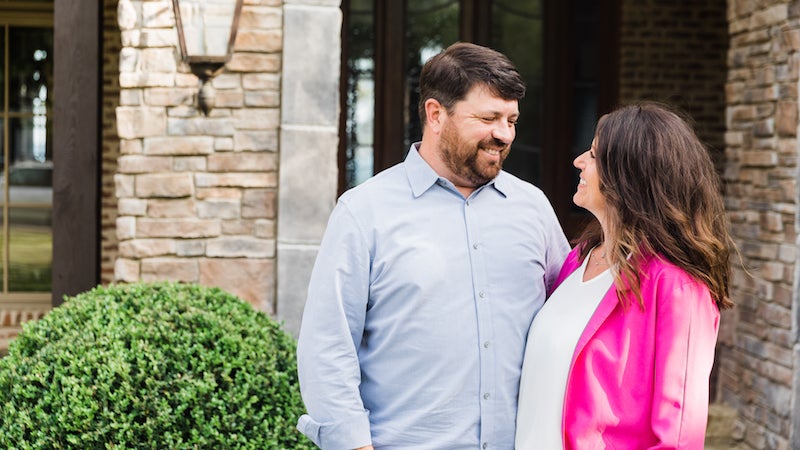
“There’s a lot of wanting to stick your head in the sand,” Brian says. “People don’t want to acknowledge the fact that they are battling this. Addiction still has a stigma especially here. The biggest struggle in our area is wanting to sweep it under the rug, and there’s shame and the guilt associated with it in our community. (And often people) are so embarrassed and ashamed and frustrated that they don’t know what to do.”
Rachel picks up from there. “(We want) the Instagram perfect story family (where) there is nothing wrong. I experienced that,” she says. “When everything was really bad, I guarded that with my life. I didn’t want anyone to know. When you can start talking about it (though), there is so much freedom in asking for help and having people support you through it.”
Rachel hasn’t been quiet about their story since Brian’s recovery, but telling it at a Storytellers Live event that was also recorded for a podcast in February 2018 opened more doors for conversations than she could have imagined. She’s gotten an overwhelming response from people in Birmingham and surrounding areas saying they were going through the same thing. In fact, she’s had someone reach out to her at least once a week since then, and in July 2019 she and Brian participated in another Storytellers Live event to jointly share their story to a coed audience.
That night Brian also shared he’d just started a position as executive director of Turning Point Foundation, a 90-day recovery facility in Thorsby that takes up to 30 men at a time. Two years into sobriety, when the Stockards were still in the “financial ringer” that his addiction had taken them to, some friends at Cocaine Anonymous raised money for Brian to attend Highlands College, Church of the Highland’s ministry training school, which would eventually lead him to Turning Point.
“Once we decided to talk about this, all these things have happened that have blown our mind,” Rachel says. “We couldn’t have written this story.”
More than anything, Rachel wants to be the person she wished was in her life back in 2013 when she was hiding behind her sunglasses. “(Addiction is) not something we talk through at the baseball fields or is easy for people to talk about,” she says, “but it’s so comforting to say, ‘Me too, that happened to me, and I was crazy too.’”
Listen to the Stockards on StoryTellers Live Podcast
- Supporting Your Spouse in Addiction: Rachel [Episodes 8 & 34]
- Redemption after Addiction: Rachel & Brian [Episode 54]
Learn more at storytellerslive.org.
Changing Lives at Turning Point
Brian started as executive director of Turning Point last summer. The non-profit, in-house recovery center on a 10-acre property 45 miles south of Birmingham is as a faith-based, 90-day program for up to 30 men at a time who are struggling with addiction. Learn more about its work at turningpointal.org.

